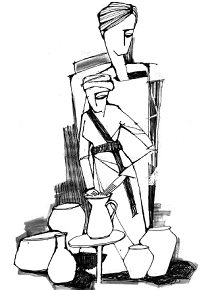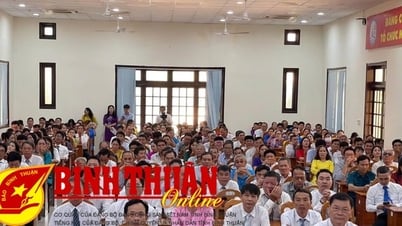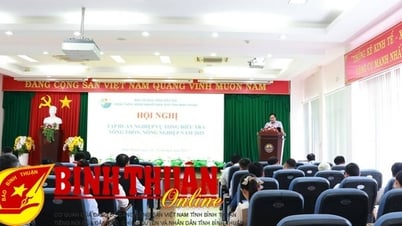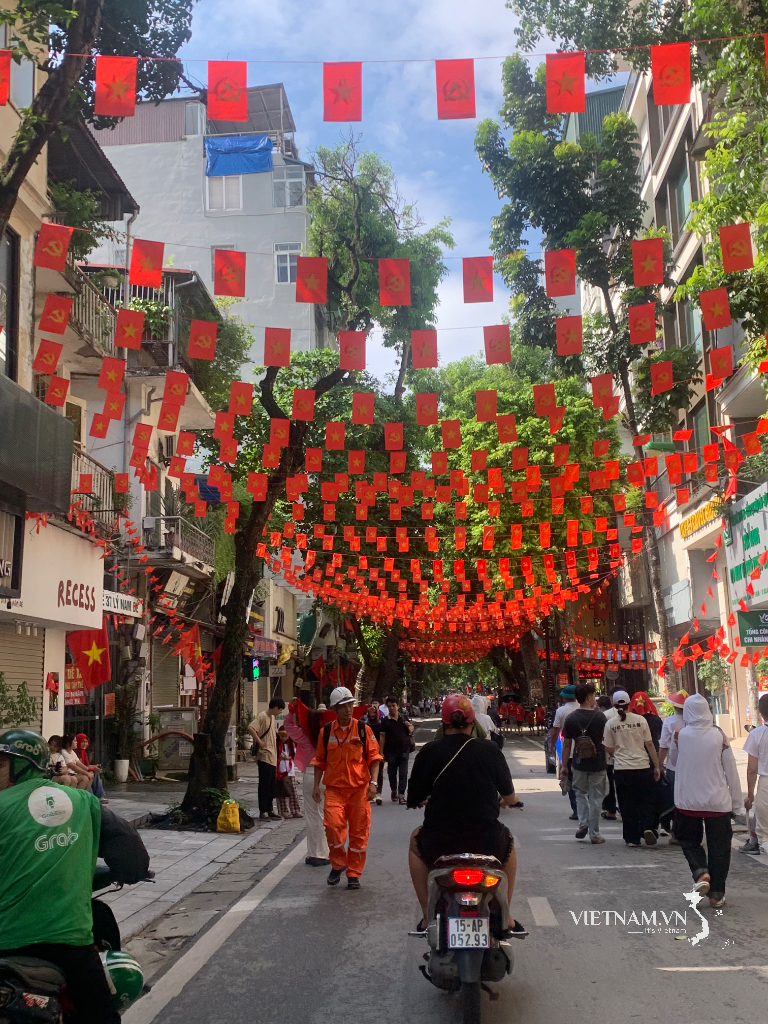Where are you going, Uncle?
Khoi refused. He wanted to visit the place that preserved the national spirit of a young woman from the past whom he had been searching for after a long period of oblivion, but then he got on the back of the motorbike and asked the driver to take him to a nearby hotel or guesthouse.

The small town, apart from the busy highway running through the center, had tree-lined, quiet streets. The small hotel probably didn't attract many guests because the town lacked tourist attractions and was far from the sea. It was hot! Khoi, having just showered, could already feel the sweat dripping from his skin. He lay stretched out on the bed, lost in thought. Even now, having arrived in this town, he was still surprised by his hasty departure. What was Khoi looking for here? A business opportunity in handcrafted ceramic decorative items, or just an excuse to rediscover a figure he'd met only a few times before she vanished into thin air decades ago? A fleeting, romantic, and melancholic feeling in the misty, chilly mornings of his hometown, D'Ran, or a call from the depths of his soul, echoed in the mournful whistle as the train from Thap Cham station slowly stopped at D'Ran station? Or were both reasons for his presence here?
Yesterday afternoon, while sorting through old paintings in his studio, Khoi came across a cherished memory, a long-forgotten recollection: a painting of a Cham girl sitting on the D'Ran train station platform, surrounded by large baskets filled with pottery used in her family's cooking. She was watching the train, its white smoke billowing, on its way to Da Lat station. A few strands of straw used to hold the pottery were blown by the wind and clung to her golden hair, which shimmered in the morning sunlight streaming across the station's eaves. Khoi had painted this picture as a gift for a young girl, but never had the chance to give it to her.
In a corner of the painting, a scrawled inscription beckoned him to this place: "To Mưna - a young woman from Gọ village, Phan Lý Chàm, Bình Thuận ." Gọ village! He had long been looking for a place to order handcrafted ceramic art; why not go to Gọ village? Kill two birds with one stone! Thinking this, he set off the very next day.
***
Khoi had a habit of… sleeping in. He stayed up late, and in the early morning, he would comfortably curl up in his warm blanket. The climate in D'Ran was cool and crisp. The early morning sky was hazy with mist. Only when a little weak sunlight clung to the windowpane did he get up, wash up, and change clothes for his morning walk. Khoi had a habit of strolling along the road that wound around the town, breathing in the fresh air and stopping at the train station, imagining the iron wheels of the Thap Cham – Da Lat train rubbing against the tracks as it ascended, the heavy train whistle groaning, and the hurried plumes of white smoke billowing from the locomotive.
Many times, while taking his early morning walk before heading to the train station, Khoi would stop in front of a white-walled house, silently gazing at the closed, equally white windows. He imagined a young woman his age inside that white house, turning over to pull the thick blanket up to her chest and trying to evacuate from her dreams. The young woman he had only seen from afar, and then sketched her image on the canvas, but never completed the painting.
Because Khoi was preoccupied with another painting. The painting he had accidentally found yesterday afternoon among the dusty paintings stacked against the wall of his studio.
On the platform, Khoi slowly sipped his hot coffee. The coffee, brewed in a cloth bag and simmered in an earthenware pot over a glowing charcoal fire, emitted a fragrant aroma. Several familiar passengers sat on low stools around the fire, creating a warm and intimate atmosphere, surrounded by the slowly dissipating scent of coffee, perhaps due to the cold air. Khoi didn't join the conversation, focusing intently on listening and eagerly awaiting the train whistle. He was impatient because he desperately wanted to see the girl again – an image he knew would be recreated in his mind, a beautiful picture.
On the steps of a train carriage, several women in indigo dresses were hurrying down bamboo baskets full of pottery onto the platform, just in time for the train whistle to signal the train's departure. Then, clinging to the iron railing of the steps, they nimbly returned to the carriage. On the platform, two people, a woman and a young girl, were struggling to carry the baskets under the eaves. "That's so much work!" thought Khoi, and he approached the woman, offering to help.
Taking the baskets from the woman's hands, he and the girl continued their work. When finished, Khoi sat down to catch his breath; the girl, without a hint of fatigue, continued arranging the pottery in the baskets. These included pots, pans, wood-fired stoves, water jars, and other containers. As she leaned over, the morning sunlight brushed through her hair, glistening the golden straw clinging to it – the straw used to cushion the pottery to prevent breakage during transport. Khoi gazed intently at her face, framed by the gentle morning light. And he knew he would capture a beautiful picture, for he was truly moved by the girl's pure, rustic beauty.
The young Cham girl lived in Go village, a village specializing in making household items from clay. Go village was in a different province, and through a newly acquainted friend, he learned that it was a village with a majority Cham population. They farmed, raised horned livestock, and made pottery to sell in many places, especially in rural areas. Every few days, after selling all their goods, they would take a train from Thap Cham station to D'Ran, Da Lat. The girl and her mother sold their family's products in D'Ran and surrounding markets; others brought their goods to Da Lat station and then sold them in more distant markets.
Every morning, the mother and daughter hire a cart to deliver or sell their goods at the markets. At night, they sleep under the eaves of the train station, surrounded by their merchandise.
Khoi spent many afternoons chatting with the girl from afar, after she and her mother had finished their simple meal of rice cooked in an earthenware pot and a few freshwater fish stewed in a pan placed over a charcoal-fired stove… He watched curiously as the mother and daughter busied themselves cooking with rustic utensils, while everyone else used aluminum pots and kerosene stoves. He also enjoyed prompting the girl to innocently tell him about her hometown and a profession that was completely unfamiliar to him.
"My family is very poor! My parents only have a few acres of rice paddies, but farming doesn't even provide enough rice to eat for a year! My father drives an ox cart to get good clay from far away, it takes him three days to get home; then he has to go collect firewood to fire the pottery. My mother and I sift the clay, knead it, and let it ferment; only then do we make the pots, pans, and other pottery... The pottery in my village has two special things that set it apart from other places: the craftsmen don't use a potter's wheel; they walk around a table to mold the pliable clay into finished products. My village also doesn't have kilns; all the finished products are brought out and stacked in the open fields, covered with straw and dry firewood, and when the wind picks up, they light the fire and... the products are fired."
***
Following the hotel owner's directions, Khoi took a motorbike taxi to Go village, a few kilometers from where he was staying. While kitchen utensils in each household, made of high-quality aluminum, stainless steel, and glass, have long replaced traditional items in the countryside, the traditional craft of Go village still survives, and its products are still distributed to many rural areas.
Khoi visited the oldest pottery-making family in the village. In the spacious courtyard, finished products were arranged in long rows, drying in the sun, waiting to be taken to the firing area. The sunlight cast various shades on the products, gently swaying the leaves of the betel nut trees along the garden's edge.
The artisan moved around the low table, her hands nimbly kneading the smooth clay. She broke off pieces of excess clay to fill in gaps or used a bamboo knife to smooth out rough areas, all while chatting with the curious customer.
- My villagers only earn a meager living from their labor because everything is so expensive now; from clay and firewood to labor and transportation… Lately, goods have been selling poorly because people are using more and more aluminum and stainless steel products…
Khoi gazed intently at the diligent girl, picturing Muna of decades ago nimbly breaking lumps of clay, her hands swiftly kneading and shaping, moving around the table, then admiring her finished product with satisfaction. How many Cham women, following the matriarchal system and inheriting the pottery craft from their mothers, have walked around this craft table for generations, developing and preserving a traditional craft of their people in an increasingly abundant and industrialized society.
Khoi was sounding out the idea:
- He wants to order some decorative items for the house and garden, such as vases, flower pots, fish figurines, masks, lampshades, etc. Can you help him?
The girl didn't seem surprised:
- Previously, some people commissioned me to make decorative items. They would draw the design and give me the dimensions, and I could make them.
Khoi was happy:
- He'll definitely sign the contract with you, but… do you know why he knows about this Gọ village?
Khoi wanted to explain to the girl another reason for his presence.
- Years ago, he met a girl of fifteen or sixteen, about the same age as your granddaughter, from this village who was bringing goods to D'Ran station…
The girl stopped what she was doing, looked up at the customer's faded hair, and asked:
- How old was he that year?
He was about five or six years older than that girl.
- Then you wait until my mother comes back from the market, and ask her; maybe she'll know…
Khoi didn't think he needed to find Muna, because if she were still alive and they met, he would recognize her as an old woman, since the girl from years ago was now nearly seventy years old. He was simply searching for a beautiful memory from a romantic childhood.
The mother returned from the market and invited Khoi into the house. After listening to his brief account of the story, her dark eyes lit up, and she asked in a trembling voice:
- Are you… an artist?
A jolt of electricity ran through Khoi's body, and he was flustered:
- I only practice drawing portraits.
The mother looked at Khoi in silence, then she pointed to the portrait hanging on the wall.
- The person you met at D'Ran train station was my mother. She told me about a painter who painted her sitting on the platform. She passed away more than ten years ago.
While Khoi was still reeling from the seemingly unbelievable encounter, his mother opened a cupboard and took out a stack of papers from a metal box that had been a cake box. She selected a thick sheet of paper, about two pages thick, from the stack and handed it to him. In the light of the lamp his mother had just switched on, he saw Muna shyly looking at the pottery she had just taken out of the large basket, a few strands of golden straw shimmering in the morning sunlight hovering around her, some clinging to her flowing, side-swept hair.
That was the pencil sketch of Mưna on the train station platform years ago that Khôi gave her. He had also promised to give her a framed painting, but there was no longer an opportunity, because the Tháp Chàm – Đà Lạt cog railway line ceased operation. The Cham women wearing long indigo skirts and Mưna no longer brought pottery to sell in the highland markets.
Khoi looked at the Cham mother, at the girl working around the pottery table, vaguely seeing the likeness of Muna in his two descendants; and vaguely heard the mournful sound of a train whistle in the vast expanse of swirling mist…
Khoi promised Mưna's niece that he would return the next day with sketches of decorative items that he would commission her to produce handcrafted from Gọ village pottery. He knew he would return many more times to this space, imbued with Mưna's image through her niece's diligent daily work, producing not only kitchen utensils but also artistic pottery items to beautify life.
Source: https://baobinhthuan.com.vn/tinh-tho-130629.html



















![[Image] Ho Chi Minh City simultaneously commences construction and breaks ground on 4 key projects.](https://vphoto.vietnam.vn/thumb/340x192/vietnam/resource/IMAGE/2026/01/15/1768472922847_image.jpeg)









![[Video] Discovery of a 6-meter-thick cultural layer at Thang Long Imperial Citadel](https://vphoto.vietnam.vn/thumb/402x226/vietnam/resource/IMAGE/2026/01/16/1768547257882_image.webp)



































































Comment (0)